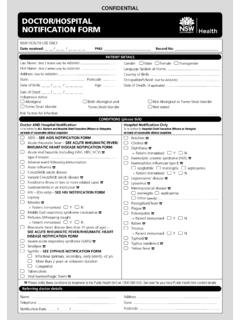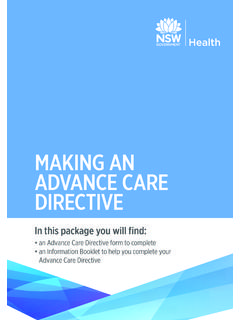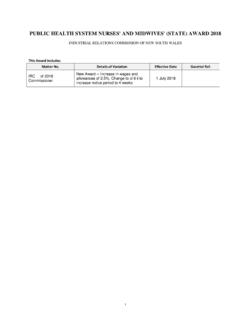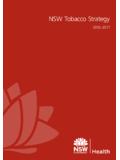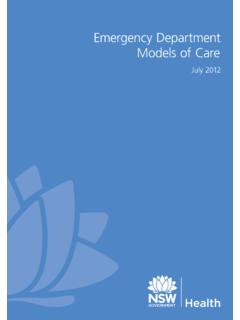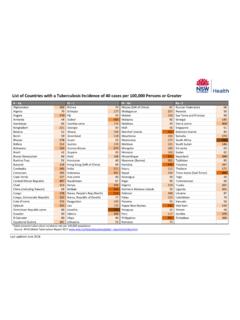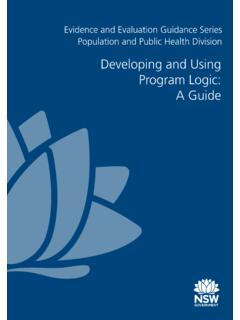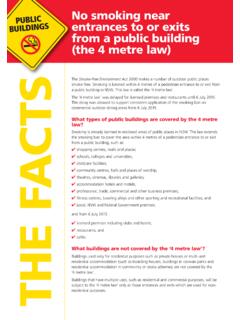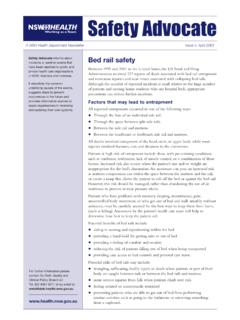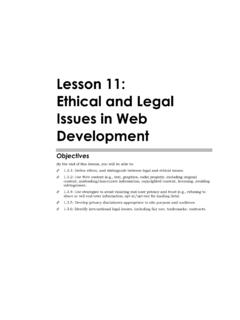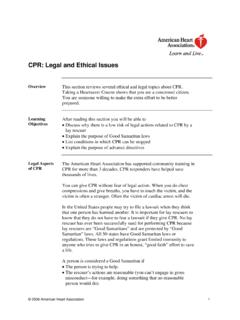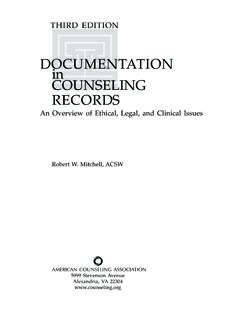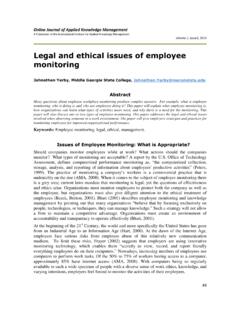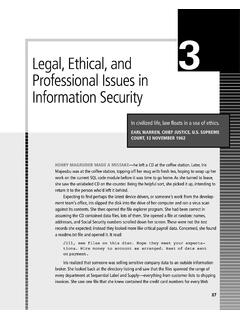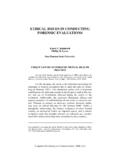Transcription of SECTION 3.5 MEDICO-LEGAL ISSUES - Ministry of Health
1 SECTION 3 .5 MEDICO - legal ISSUES 107 MEDICO-LEGAL ISSUES MELISSA KANG AND JANE SANDERS legal and ethical frameworks are fundamental to the professional conduct and practice of Health care. Working with young people involves additional considerations because of their legal status and their stage of development. The law is not clear-cut in many aspects relating to young people under 18 years: much is left to the judgement of the medical or Health professional as to the maturity of the young person and their capacity to consent. This chapter provides a broad overview of the major legal and ethical ISSUES as they might apply to young people, particularly those under 18 . They include: The capacity of adolescents to consent to medical treatment on their own behalf Parental consent to treatment Confidentiality, privacy and access to medical records Child protection and mandatory reporting This chapter is not a prescriptive statement of the law.
2 If you are faced with a situation in which you are unsure about how the law applies, you can seek legal advice through your employer or insurer . UNDERSTANDING MEDICO legal TERMINOLOGY The terminology used to describe recipients of Health care and Health care providers is different in different pieces of legislation . In this chapter: Medical treatment may not necessarily refer only to treatment performed by a medical practitioner . In some contexts, treatment may include Health care or advice provided by other practitioners such as nurses or counsellors . In general, Health informa tion and education is not subject to the same laws as medical treatment, and may be provided to children regardless of their age . Patient is used to reflect the terminology used in much of the relevant legislation although in some Health care settings, the term client might be used instead.
3 Medical practitioner and Health practitioner are used based on the legislative source of the obligation . Many obligations, such as the obligation to privacy, may be covered by several pieces of legislation that apply to both medical and non-medical Health professionals . To make sure it is clear, in this chapter a medical practitioners is a Health practitioner . Children or child will be used often in this chapter when referring to the legal definition of a child which is anyone under 18 years . UNDERSTANDING CONSENT When can a young person under 18 years make his or her own decisions about medical treatment? Can parents or guardians make decisions about medical treatment for young people under 18? In what situations will it be necessary to seek an order from a court or tribunal? Health practitioners may have concerns about these questions because: They are unsure how to assess a young person s capacity to give their own consent even if, strictly speaking, the law allows them to; They are unsure about where they stand from a legal perspective if they assess a young person as having capacity to consent to medical treatment and then proceed to provide that treatment; They are unsure whether they can, or should, involve parents in decisions about consent.
4 No matter the patient s age, consent to medical treatment means that the patient makes a decision about their treatment, usually based on information and advice given by the Health practitioner . You must have consent before commencing treatment . Lack of consent may expose a Health practitioner to the possibility of civil or criminal liability . To be valid, consent requires certain qualities: The patient must have the capacity to give consent The patient must be able to understand the general nature of the treatment The consent must cover the act performed The consent must be voluntary INFORMED CONSENT Informed consent is a separate concept to consent, but it is related . Informed consent means consent to treatment after having been informed of all significant risks asso ciated with the treatment . All Health practitioners should try to ensure that patients are fully informed of the risks and benefits of any treatment before obtaining consent.
5 THE CAPACITY OF ADULTS TO CONSENT OR TO REFUSE TREATMENT Across Australia, 18 years is the legal age of majority ( adulthood ) . The law assumes that adults SECTION Three - Chapter Five 109 SECTION Three - Chapter Five are competent to make decisions (either consent or refusal) about their medical treatment even if their decision is deemed not to be in their best interests . There is an exception for adults who lack the capacity to make treatment decisions, such as people with intellectual disabilities or those affected by certain forms of mental illness . All states and territories in Australia have laws that allow others (e .g . family members, guardians, courts or tribunals) to make decisions for people who lack the capacity to make decisions on their own behalf . THE CAPACITY OF YOUNG PEOPLE TO CONSENT TO TREATMENT Young people under 18 are minors under Australian law.
6 Minors have the legal capacity to make their own decisions, independently of their parents, in a variety of situations (Lennings 2013) . In general, if the patient is under the age of 14 years, the consent of the parent or guardian is necessary . Minors aged 14 and above may have the capacity to consent to medical treatment depending on their level of their level of maturity; their understanding of the proposed treatment and its consequences; and the severity of treatment . A Health practitioner must make a case-by-case assessment of whether the young person has sufficient understanding and intelligence to enable him or her to fully understand what is proposed . PARENTAL CONSENT FOR TREATMENT If a child under 18 does not have the capacity to consent to treatment, in general a parent may consent on their behalf . In many cases, even if a child is competent to consent on their own behalf, a parent may still validly consent on their behalf.
7 However, if a Health practitioner considers that a child is competent, it may be appropriate to obtain both parental and patient consent . For some types of major and special treatment (such as sterilisation) parental consent is not sufficient, and a court order is required . EMERGENCY TREATMENT In general, treatment may be performed without the consent of either the parent or the child if the Health practitioner is of the opinion that the treatment is necessary, as a matter of urgency, in order to save the child or young person s life . In practice, that means that emergency medical and first aid treatment may be provided without the consent of the minor or a parent or guardian . THE LAW ABOUT CONSENT TO MEDICAL TREATMENT FOR CHILDREN Australian law is a mixture of statute law (Acts and Regulations, also known as statutes or legislation, made by Parliament) and common law (which is made by the courts when they make decisions which set a precedent for future cases).
8 In all Australian states and territories except South Australia, there is no legislation specifying when a child may consent to medical treatment on their own behalf . Instead, the common law applies . At common law, a child under 18 may legally consent to most types of medical treatment on their own behalf if they are competent to do so . If the child is not competent, parental consent must usually be obtained (Bird 2005) . The common law position relating to a minor s competence to consent to treatment was estab lished by the English House of Lords decision in a case known as Gillick (Gillick v West Norfolk and Wisbech Area Health Authority[1986] AC 112) and was adopted by the High Court of Australia in a case known as Marion s case (Secretary, Department of Health and Community Services v JWB and SMB (Marion s case) (1992)175 CLR 218) The Gillick case concerned an application by a mother for an order to prohibit the local Health authority from giving contraceptive advice to her teenage daughters without parental consent.
9 The court dismissed Mrs Gillick s claim and held that parental authority over their child diminishes as the child becomes increasingly mature . The court held that a child with the maturity to understand the nature and consequences of the treatment has the legal capacity to consent on their own behalf, without the necessity for parental consent or knowledge . The term Gillick competence is now widely used by lawyers and Health practitioners dealing with young people (Wheeler 2006) . It is also common to refer to the mature minor principle . For a child to be Gillick competent he or she must have sufficient understanding and intelligence to enable him or her to understand fully what is proposed . This must be assessed on a case-by-case basis depending on the nature of the treatment proposed.
10 SOUTH AUSTRALIA SECTION 6 of the Consent to Medical Treatment and Palliative Care Act 1995 (SA) provides: A person of or over 16-years-of-age may make decisions about his or her own medical treatment as validly and effectively as an adult. This means that 110 a child aged 16 or over has the capacity to refuse treatment as well as consent to it. A child under 16 can validly consent to treatment if: The medical practitioner is of the opinion that the child capable of understanding the nature, conse quences and risks of the treatment and that the treatment is in the best interest of the child s Health and well-being, and That opinion is supported by the written opinion of at least one other medical practitioner who personally examines the child before the treatment is commenced. ( SECTION 12, Consent to Medical Treatment and Palliative Care Act 1995 (SA)) If emergency medical treatment is required to meet an imminent risk to life or Health and the patient is incapable of consenting (e.)
